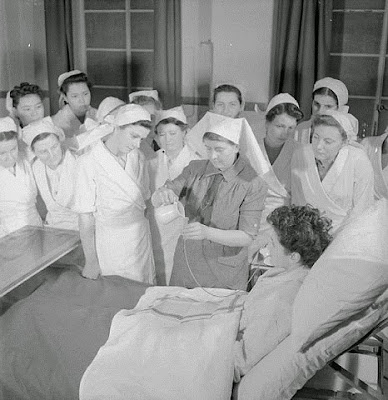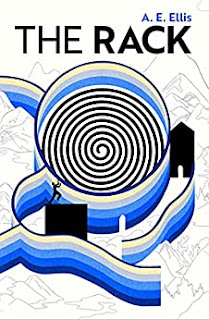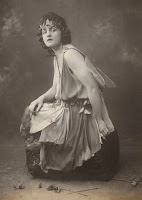The book The Rack, by AE Ellis, has just been published in a new edition in the UK – it is a strange and unusual book, and I covered it on the blog two years ago Christmas in the sanatorium (clothesinbooks.blogspot.com)
It was recommended by a reader when I did a series of entries on sanatorium-lit a while before – as I explain, I had missed it out because I had never heard of it. This entry gives a good overview of my wide reading on the subject, with links, and on the whole strange and sad business of the attempts to tackle TB.
My proud boast is that I read Thomas Mann’s the Magic Mountain (700+ pages) - as well as everything else.
If I wanted to recommend one book about TB sufferers, though, it would be Betty MacDonald’s The Plague and I. (There are more posts here and here). As I keep saying – others find this book hilariously funny, and I just plain didn’t, but it is a compelling and convincing picture of the author’s stay in a sanatorium in Washington State in the US in the late 1930s. Betty MacDonald wrote gently massaged memoirs – tidied up and changed around and very anecdotal – but the essential truth seems manifest. Her first huge bestseller, The Egg and I, brought on lawsuits from those who claimed to feature in it, so everyone was very careful next time around. The line between fiction and non-fiction is challenged by her books, but the setting in the sanatorium, and the details of the treatment, are authentic.
If you are interested in this author (as I self-evidently am) I can highly recommend a book by Paula Becker, Looking for Betty MacDonald, published 2016. It is a model biography – very well-researched, and just personal to the right degree. Plainly Becker loved MacDonald and her books, but she still allowed herself to be clear-eyed about some aspects of the life, the work and the way the two combined. I enjoyed it hugely.
These are Becker’s immensely helpful comments on The Plague and I:
The book is educational. Betty feeds the information about tuberculosis to readers through the device of patient dialogue. Her descriptions of her medical interventions are specific and graphic. She manages to convey the endless tedium of round-the-clock resting without making readers feel that they are enduring tedium themselves. She examines her own reactions to the situations she faces, drawing readers into her personal struggle. When she is discharged, they share her overwhelming awe at being privileged to reclaim ordinary life.
Reading a new review of The Rack, and remembering my strange venture into sanatorium books in the past, made me think about books on illness – probably the Late Unpleasantness has also directed my ideas. So I have made a list of some other books on these topics that I have blogged on:
W Somerset Maugham The Painted Veil Haunting and very under-rated, this 1920s look at the colonizing classes in the Far East features a cholera outbreak as a key plot point. Posts here and here, and there is also an excellent 2007 film. I always say the same thing about WSM: his women characters (and their sexuality) are streets ahead of his contemporary male authors, and his reputation should be much higher.Emily St John Mandel’s Station Eleven had a moment during the pandemic, and was made into a drama series. I blogged on the book back in 2014, and said this: ‘it is terrifying, disorienting, enthralling, creepy and life-affirming. It deals with the aftermath of a deadly flu, which wipes out 99% of the population and leaves civilization as we know it destroyed.’ It is a great book.
Much less well-known is The Blondes by Emily Schulz: ‘It is hilarious and satirical, and while telling a scarey and unsettling dystopian-future story, also gives a great commentary on modern life, gender relations, and both the way we look, and the way we look at one another. A very nasty virus is hitting women, and mostly blonde women. It causes them to act strangely and then to attack, and often kill, people. It is something like rabies.’
Blogfriend Christine Poulson is writing a marvellous series of medical thrillers – highly recommended. There’s Deep Water, Cold Cold Heart, and An Air That Kills – they all combine meticulously-researched medical plotlines, fascinating settings (the Antarctic anyone? Guess which title…) with proper crime novel puzzles and clues, and featuring Katie Flanagan, an excellent protagonist.
Jane Smiley Ten days in the hills (post here, with a link to a previous one) A group of people are holed up together in a posh house outside Hollywood, while something bad rages outside. The idea comes from The Decameron by Boccaccio, in which it is plague the story-tellers are avoiding, whereas here it is war – but I am going to include it because I LOVE this book, I think it is a great contemporary American novel, and I do not know why it is not better known. (And for no good reason I can include this quote: She laughs. ‘They could tell Boccaccio a tale, those sinners at Wolf Hall.’ Guess which book that comes from. )
The very latest addition: Jim Noy’s The Red Death Murders – on the blog a few weeks ago – features a group of men locked up in a castle while plague rages outside. They fight hard to keep out any possibility of infection, but also are trying to find out who is killing them off one by one, and how they are doing it.
Hamnet by Maggie O’Farrell had a moment during the pandemic too, as by chance it featured plague carrying off William Shakespeare’s son in 16th century Stratford. A lovely and affecting book, and O’Farrell has made a wonderful heroine out of one of the unknown women of history.
Green For Danger by Christianna Brand isn’t so much about illness, but its hospital setting is all-encompassing, and it is one of my favourite murder stories of all time, so it gets a place here. PD James’s Shroud for a Nightingale gets in with the same justification. If you’ve read the book you’ll get the (top) picture…
Coming out the other side – there are also on the blog no less than two posts featuring books for convalescents – one with suggestions from me, one full of ideas from readers.
So obviously I’m now going to say – what books on illness, hospitals, plague, viruses, nurses and doctors do you recommend? Add them to the comments please.





I loved The Plague and I, Moira. I hadn't thought about it in years, but I remember it well. What I especially remember was the attitudes of others towards those who had TB. There's also Betty Martin's Miracle at Carville, which tells the story of a young woman who is diagnosed with leprosy. I thought that was excellent, too.
ReplyDeleteOh thanks Margot, I haven't heard of that one and will look it up. And yes, Betty MacDonald's book is real modern social history.
DeleteThere seem to be thee versions of The Rack available now: the original version - edited by James Michie in the 1950s and available from Valancourt books, a version edited from the original ts. by Alan Wall published by Zephyr Books and this one, which if is is 544 pages must be much fuller than the others. There are times when I wonder if being a completist is quite such a good idea.
ReplyDeleteOne of the great - and heroic - tragic books about illness is W,N,P Barbellion's The Journal of a Disappointed Man.
Was it you who told me about the book? I don't know why edition I read, but I can say it was plenty long enough.
DeleteI read the Barbellion a long time ago, I just remember finding it very sad...
It could have been me who told you about The Rack - every time I see discussions of books about illness I mention it.
DeleteThe Journal of a Disappointed Man is very sad. It is also heroic. Another writer about illness is Denton Welch, who spent fourteen years dying from kidney injuries received when he was knocked off his bicycle and wrote several fine books in that time.
One book I do know I mentioned to you: have you got round to The Last Englishman - Byron Rogers's biography of J.L. Carr - yet?
I have read Denton Welch but could never take to him, poor sad man that he was.
DeleteOK I have finally ordered the Carr biography - I have SUCH fond memories of the RS Thomas one, I hope this one lives up!
I think the Carr is even better than the Thomas, so I hope you enjoy it.
DeleteRoger's collections of essays are good as well.
I loved his style in the Thomas book, so expect I should read the essays. The Carr is on its way - I decided on a print copy, and amazon keep telling me 'you could start reading it on Kindle', which would of course mean paying twice!
DeleteI'd say The Plague and I was witty rather than funny.
ReplyDelete...also that it was based on a diary, and diaries make excellent books.
ReplyDeleteYes to both those comments!
DeleteI do have to give a shout out to Knock and Wait, which I think fits the category! (and while I know you found it really sad (fair point) in many ways for a book that's supposed to be so full on funny, I still chuckle over it to this day...)
ReplyDeleteYes it was a fascinating book, and it did have funny moments. And if people follow enough links above they will find the blogpost on it!
DeleteOne Pair of Feet, by Monica Dickens, is set in a hospital during WW2, but one of the reasons I quite like it is that the war hardly intrudes. Nobody is noble and heroic, they're quite often annoying or petty. Similarly Florrie's Girls by Maeve Kelly - Irish nurses in 1950s London. I think it's out of print (I had it from the library) but I recall it being good about how dehumanising the hospital system was. And one of the characters gets TB, just at the time where it starts being more easily treatable.
ReplyDeleteI always enjoy a Monica Dickens, but I haven't read that one since the school library - I always say MD was the archetypal author featured in girls' school libraries of my era. But my era was many many years ago, so maybe I should re-read.
DeleteI don't know the other one at all, I will look it up.
Thank you for the kind words, Moira!
ReplyDeleteThere's a rather fascinating sub-genre of crime fiction where the detective is ill or recovering from an accident. Josephine Tey's The Daughter of Time (broken leg) is maybe the best known, but more recently Peter Dickinson's One Foot in the Grave (stroke - I think) and Leif G. W. Persson's The Dying Detective (definitely stroke). And this has reminded me of one of my favourite films, Rear Window, based on a Cornell Woolrich short story.
Yes that's a good niche area isn't it? You should do a list blogpost...
DeleteIsn't there a Colin Dexter book where Morse solves a crime from his bed too?
Oh yes! The Wench is Dead. Also a historical murder, like The Daughter of Time.
DeleteElizabeth is Missing by Emma Healey features an old lady with dementia investigating the disappearance of a friend and the disappearance of her sister over sixty years ago. A very good book.
DeleteYes indeed Chrissie, that's the one.
DeleteRoger, I have been meaning to read that one for a long time, I don't know why I haven't got round to it.
On Being Ill - not a novel, but a beautifully written essay by Virginia Woolf, containing her thoughts about illness, alongside her thoughts when ill, taking in books, people, clouds and a host of other topics. She shows how illness changes our perception of the world and our place in it.
ReplyDeleteOh I must read that! I have read a lot of Virginia Woolf, including essays, but don't remember seeing that one.
Delete